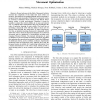697 search results - page 18 / 140 » New Criteria and a New Algorithm for Learning in Multi-Agent... |
IJON
1998
13 years 8 months ago
1998
Bayesian Kullback Ying—Yang dependence reduction system and theory is presented. Via stochastic approximation, implementable algorithms and criteria are given for parameter lear...
ICRA
2009
IEEE
14 years 3 months ago
2009
IEEE
— Recent advances in the field of humanoid robotics increase the complexity of the tasks that such robots can perform. This makes it increasingly difficult and inconvenient to ...
ATAL
2010
Springer
13 years 10 months ago
2010
Springer
The coordination of emergency responders and robots to undertake a number of tasks in disaster scenarios is a grand challenge for multi-agent systems. Central to this endeavour is...
ML
2007
ACM
13 years 8 months ago
2007
ACM
We offer a new formal criterion for agent-centric learning in multi-agent systems, that is, learning that maximizes one’s rewards in the presence of other agents who might also...
ECAI
1990
Springer
14 years 1 months ago
1990
Springer
In case-based reasoning (CBR) a problem is solved by matching the problem description to a previously solved case, using the past solution in solving the new problem. A case-based...

